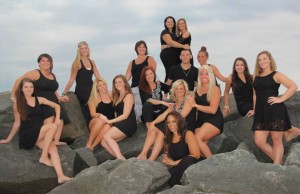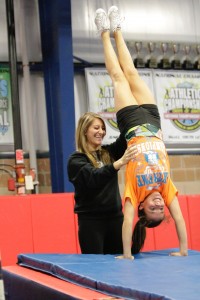Incentive Programs: Do They Work?
 At Avon, OH-based Tumbles & Cheers, the more coaches put into the program, the more they get out of it. Owner Heather Zidek offers her coaches a financial incentive based on their performance. “We have all sorts of different factors that go into the compensation they receive— everything from retention rates to how high enrollment is in their classes to how their teams perform,” shares Zidek. “For each of those factors, they would get a bonus.”
At Avon, OH-based Tumbles & Cheers, the more coaches put into the program, the more they get out of it. Owner Heather Zidek offers her coaches a financial incentive based on their performance. “We have all sorts of different factors that go into the compensation they receive— everything from retention rates to how high enrollment is in their classes to how their teams perform,” shares Zidek. “For each of those factors, they would get a bonus.”
Tumbles & Cheers’ incentive program is in its second year, and so far, Zidek is happy with how it’s going. “It increased our enrollment overall as a gym because the coaches were willing to put a little bit more effort into it, following up on kids that had come to trial classes, knowing that they could benefit,” she explains.
Zidek calculates the coaches’ bonuses at the end of every month. She says, “It’s all structured – they know how much they’ll get. The first of every month is when they get the bonuses for the month prior.” Though Zidek says it can be somewhat time-consuming to calculate the bonuses every month, the effort is worth it: “There haven’t been any drawbacks, really, because it’s increased our bottom line as a company.”
Lee Ward, owner of Plano TX-based EC Athletics, offers coaches at his gym a similar incentive, but on a yearly basis. He says, “[Our] bonus structure is fairly involved,” says Ward. “Basically it looks at retention rates, and not necessarily wins or losses in competitions, but the percentage of perfection scores that they get, for each team for the entire year.”
The bonuses are calculated after the competition season is over. “It’s over at the end of April [or] beginning of May, so we do our computations on the first of June, and we have it out the middle part of June.”
 Last year was Ward’s first year offering the incentives, and he plans to continue it—with a few adjustments based on the unified scoring system. He noted, “They changed the scoring system on us, so we’re going to have to revise it a bit this year.”
Last year was Ward’s first year offering the incentives, and he plans to continue it—with a few adjustments based on the unified scoring system. He noted, “They changed the scoring system on us, so we’re going to have to revise it a bit this year.”
Are financial incentives necessary for a successful program? Karen Brenner, owner of All Star One in Egg Harbor Township, New Jersey, doesn’t think so. She says, “My incentive is: They get a paycheck. They get a job. That’s why they call it work.” Brenner was raised with a strong work ethic, and she expects the same from her staff: “I pay them well, and their incentive is to get paid.”
Brenner has tried an incentive program in the past, but it was more for fun than financial motivation. She made the staff business cards that said “Bring this in for a free tumbling class” on the back, and told her employees, “We’ll see who gets the most business cards in.” When the coaches asked, “What do we get?” she said, “I don’t know, M&M’s?” and that’s what she gave them.
Brenner does reward her teams for their hard work, but the rewards aren’t tied to specific performance metrics. For example, she capitalizes on the gym’s proximity to the Jersey Shore by renting a beach house for the All Star One gym family. “The teams take turns coming, and then we add on three extra days at the end that my family and our staff get to stay at the beach house,” says Brenner. “I try to do small things like that to show them that I care.”
Whether your gym’s incentives are tied to performance numbers or not—and whether they’re in bonuses or beach days—they could pay off by keeping your staff happy.
–Lisa Beebe








